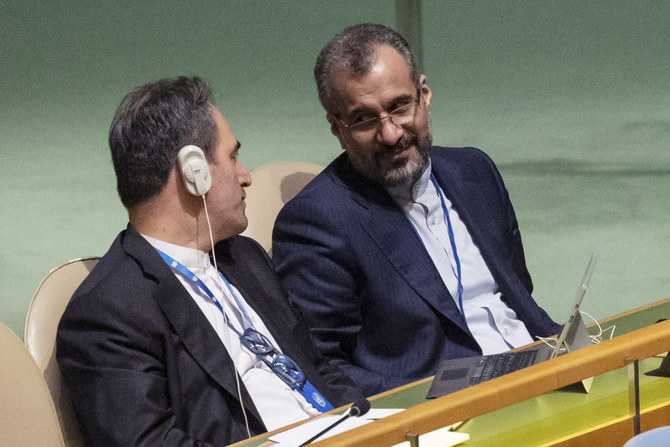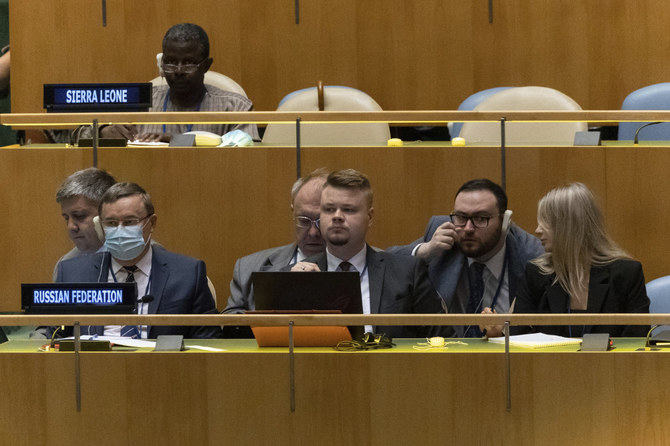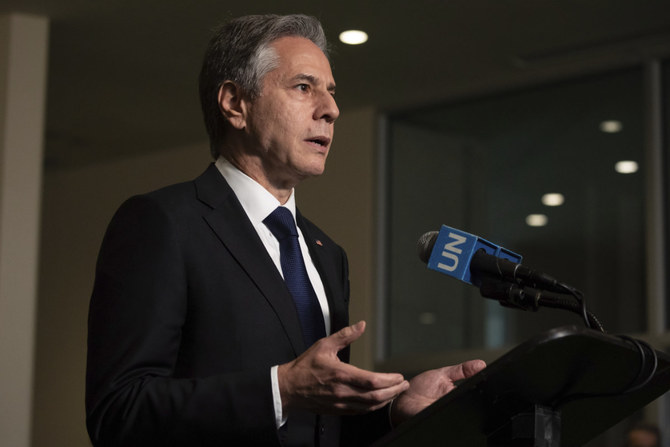UNITED NATIONS: The United Nations chief warned the world Monday that “humanity is just one misunderstanding, one miscalculation away from nuclear annihilation,” citing the war in Ukraine, nuclear threats in Asia and the Middle East and many other factors.
Secretary-General Antonio Guterres gave the dire warning at the opening of the long-delayed high-level meeting to review the landmark 50-year-old treaty aimed at preventing the spread of nuclear weapons and eventually achieving a nuclear-free world.
The danger of increasing nuclear threats and a nuclear catastrophe was also raised by the United States, Japan, Germany, the UN nuclear chief and many other opening speakers at the meeting to review progress and agree to future steps to implement the Nuclear Nonproliferation Treaty, known as the NPT.
US Secretary of State Antony Blinken said North Korea is preparing to conduct its seventh nuclear test, Iran “has either been unwilling or unable” to accept a deal to return to the 2015 nuclear agreement aimed at reining in its nuclear program, and Russia is “engaged in reckless, dangerous nuclear saber-rattling” in Ukraine.
He cited Russian President Vladimir Putin’s warning after its Feb. 24 invasion that any attempt to interfere would lead to “consequences you have never seen,” emphasizing that his country is “one of the most potent nuclear powers.”
This is contrary to assurances given to Ukraine of its sovereignty and independence when in gave up its Soviet-era nuclear weapons in 1994, Blinken said, and sends “the worst possible message” to any country thinking it needs nuclear weapons to defend itself and deter aggression.
Japan’s Prime Minister Fumio Kishida said divisions in the world since the last review conference in 2015, which ended without a consensus document, have become greater, stressing that Russia’s threat to use nuclear weapons in the Ukraine war has contributed “to worldwide concern that yet another catastrophe by nuclear weapon use is a real possibility.”
Germany’s Foreign Minister Annalena Baerbock accused Russia of “brutally violating the assurances” it gave Ukraine in 1994 and said Moscow’s “reckless nuclear rhetoric” since its invasion of its smaller neighbor “is putting at risk everything the NPT has achieved in five decades.”
Most recently, Blinken said Russia seized Europe’s largest nuclear power plant in Zaporizhzhya and is using it as a military base to fire at Ukrainians, “knowing that they can’t and won’t shoot back because they might accidentally strike a nuclear reactor or highly radioactive waste in storage.” He said this brings the notion of having “a human shield to an entirely different and horrific level.”
International Atomic Energy Agency Director General Rafael Grossi said the Ukraine conflict is “so grave that the specter of a potential nuclear confrontation, or accident, has raised its terrifying head again.”
He warned that at the Zaporizhzhya nuclear plant “the situation is becoming more perilous by the day,” and he urged all countries to help make possible his visit to the plant with a team of IAEA safety and security experts, saying his efforts for the past two months have been unsuccessful.
Guterres told many ministers, officials and diplomats gathered in the General Assembly Hall that the month-long review conference is taking place “at a time of nuclear danger not seen since the height of the Cold War.”
The conference is “an opportunity to hammer out the measures that will help avoid certain disaster, and to put humanity on a new path toward a world free of nuclear weapons,” the secretary-general said.
But Guterres warned that “geopolitical weapons are reaching new highs,” almost 13,000 nuclear weapons are in arsenals around the world, and countries seeking “false security” are spending hundreds of billions of dollars on “doomsday weapons.”
“All this at a time when the risks of proliferation are growing and guardrails to prevent escalation are weakening,” he said, “And when crises — with nuclear undertones — are festering from the Middle East and the Korean Peninsula to the invasion of Ukraine by Russia, and to many other factors around the world.”
Guterres called on conference participants to take several actions: urgently reinforce and reaffirm “the 77-year-old norm against the use of nuclear weapons,” work relentlessly toward eliminating nuclear weapons with new commitments to reduce arsenals, address “the simmering tensions in the Middle Est and Asia” and promote the peaceful use of nuclear technology.
“Future generations are counting on your commitment to step back from the abyss,” he implored the ministers and diplomats. “This is our moment to meet this fundamental test and lift the cloud of nuclear annihilation once and for all.”
Japan’s Kishida, recalling his home city of Hiroshima where the first atomic bomb was dropped in August 1945, echoed many of Guterres’ points saying the path to a world without nuclear weapons has become harder but “giving up is not an option.”
In force since 1970, the Nonproliferation Treaty known as the NPT has the widest adherence of any arms control agreement, with some 191 countries that are members.
Under its provisions, the five original nuclear powers — the United States, China, Russia (then the Soviet Union), Britain and France — agreed to negotiate toward eliminating their arsenals someday and nations without nuclear weapons promised not to acquire them in exchange for a guarantee to be able to develop nuclear energy for peaceful purposes.
India and Pakistan, which didn’t join the NPT, went on to get the bomb. So did North Korea, which ratified the pact but later announced it was withdrawing. Non-signatory Israel is believed to have a nuclear arsenal but neither confirms nor denies it. Nonetheless, the treaty has been credited with limiting the number of nuclear newcomers (US President John F. Kennedy once foresaw as many as 20 nuclear-armed nations) as a framework for international cooperation on disarmament.
The meeting, which ends Aug. 26, aims to generate a consensus on next steps, but expectations are low for a substantial — if any — agreement. There were 133 speakers as of Monday, plus dozens of side events.
The NPT’s five-year review was supposed to take place in 2020, when the world already faced plenty of crisis, but was delayed because of the COVID-19 pandemic.
Patricia Lewis, former director of the UN Institute for Disarmament Research who is now in charge of international security programs at the international affairs think tank Chatham House in London, said “President Putin’s threats to use nuclear weapons have shocked the international community.”
Russia is not only an NPT signatory but a depository for treaty ratifications and in January it joined the four other nuclear powers in reiterating the statement by former US President Ronald Reagan and former Soviet leader Mikhail Gorbachev that “a nuclear war can never be won and must never be fought,” she told The Associated Press.
Lewis said countries participating in the review conference will have a difficult decision to make.
To support the treaty and what it stands for, “governments will have to address Russia’s behavior and threats,” she said. “On the other hand, to do so risks dividing the treaty members — some of whom have been persuaded by Russia’s propaganda or at least are not as concerned, for example, as the NATO states.”
And “Russia no doubt will strenuously object to being named in statements and any outcome documents,” Lewis said.


UN chief warns world is one step from ‘nuclear annihilation’
Short Url
https://arab.news/67wex
UN chief warns world is one step from ‘nuclear annihilation’

- Secretary-General Antonio Guterres gave the dire warning at the opening of the high-level meeting to review the landmark 50-year-old Nuclear Nonproliferation Treaty
- US Secretary of State Antony Blinken echoed the warning, citing the "nuclear saber-rattling" of Russia, Iran and North Korea as reckless and dangerous
At Grammys, ‘ICE out’ message loud and clear

- Music’s A-listers on Sunday lashed out at the immigration raids rocking the United States at the Grammy Awards, with Puerto Rican megastar Bad Bunny setting the tone
LOS ANGELES: Music’s A-listers on Sunday lashed out at the immigration raids rocking the United States at the Grammy Awards, with Puerto Rican megastar Bad Bunny setting the tone.
Anger was palpable at President Donald Trump’s Immigration and Customs Enforcement (ICE) agency, whose heavily armed and masked agents have been deployed in multiple US cities.
The killing of two US citizens by federal agents last month in Minneapolis raised the temperature for many Americans, already anxious over what they think are unfocused operations unjustly sweeping up anyone who speaks Spanish or has brown skin.
“Before I say thanks to God, I’m gonna say ‘ICE out’,” Bad Bunny said to cheers from the audience in Los Angeles — only a week before he is due to headline the Super Bowl halftime show.
“We’re not savages, we’re not animals, we’re not aliens; we are humans and we are Americans,” the singer said after being given the Grammy for Best Musica Urbana Album.
The reggaeton star was not alone in calling out the actions of ICE, one of the lead agencies involved in the crackdown.
Among the couture frocks by Valentino, Chanel and Saint Laurent on the red carpet, several of those attending added an “ICE out” button to their outfits.
They included power couple Justin and Hailey Bieber, veteran songstress Joni Mitchell, US singer Jordan Tyson and actress and singer Helen J. Shen.
“I’m scared, I’m very worried,” Gloria Estefan told AFP backstage after winning the Grammy for best tropical Latin album.
“I don’t think anyone would say we want a free-for-all at the border, but what is happening is not at all ‘criminals being arrested’.
“These are people that have families, that have contributed to this country for decades, little children. There are hundreds of children in detention centers. It’s inhumane. I don’t recognize my country at this moment.”
“I guess I want to say I’m up here as a granddaughter of an immigrant,” British singer Olivia Dean — who has an English father and a Jamaican-Guyanese mother — said after scooping the prestigious Best New Artist Grammy.
“I’m a product of bravery, and I think those people deserve to be celebrated.”
“Immigrants built this country,” the breakout country star Shaboozey, who was born in Virginia to Nigerian parents, told the audience after winning the Grammy for best country duo/group performance with Jelly Roll.
“So this is for them, for all children of immigrants. This is also for those who came to this country in search of better opportunity to be a part of a nation that promised freedom for all and equal opportunity to everyone willing to work for it,” said the artist.
“Thank you for bringing your culture, your music, your stories and your traditions here. You give America color.”
US singer Billie Eilish, whose “Wildflower” scored the Grammy for Song of the Year, said she felt grateful for the award.
But, she added: “As grateful as I feel, I honestly don’t feel like I need to say anything, but that no one is illegal on stolen land.
“It’s just really hard to know what to say and what to do right now. I feel like we just need to keep fighting and speaking up and protesting, and our voices really do matter, and the people matter.”
“It’s incredibly dystopian that we’re dressed up and able to celebrate accolades... and people are getting snatched up and shot in the face on the street,” said R&B singer SZA, who shared Record of the Year honors with Kendrick Lamar.
“It just feels bizarre, and I find so many of us don’t really know how to feel right now, besides rage and hopelessness,” she said.
“I just don’t want everyone to fall into despair, because when you lose... morale, change becomes impossible.”
Anger was palpable at President Donald Trump’s Immigration and Customs Enforcement (ICE) agency, whose heavily armed and masked agents have been deployed in multiple US cities.
The killing of two US citizens by federal agents last month in Minneapolis raised the temperature for many Americans, already anxious over what they think are unfocused operations unjustly sweeping up anyone who speaks Spanish or has brown skin.
“Before I say thanks to God, I’m gonna say ‘ICE out’,” Bad Bunny said to cheers from the audience in Los Angeles — only a week before he is due to headline the Super Bowl halftime show.
“We’re not savages, we’re not animals, we’re not aliens; we are humans and we are Americans,” the singer said after being given the Grammy for Best Musica Urbana Album.
The reggaeton star was not alone in calling out the actions of ICE, one of the lead agencies involved in the crackdown.
Among the couture frocks by Valentino, Chanel and Saint Laurent on the red carpet, several of those attending added an “ICE out” button to their outfits.
They included power couple Justin and Hailey Bieber, veteran songstress Joni Mitchell, US singer Jordan Tyson and actress and singer Helen J. Shen.
“I’m scared, I’m very worried,” Gloria Estefan told AFP backstage after winning the Grammy for best tropical Latin album.
“I don’t think anyone would say we want a free-for-all at the border, but what is happening is not at all ‘criminals being arrested’.
“These are people that have families, that have contributed to this country for decades, little children. There are hundreds of children in detention centers. It’s inhumane. I don’t recognize my country at this moment.”
“I guess I want to say I’m up here as a granddaughter of an immigrant,” British singer Olivia Dean — who has an English father and a Jamaican-Guyanese mother — said after scooping the prestigious Best New Artist Grammy.
“I’m a product of bravery, and I think those people deserve to be celebrated.”
“Immigrants built this country,” the breakout country star Shaboozey, who was born in Virginia to Nigerian parents, told the audience after winning the Grammy for best country duo/group performance with Jelly Roll.
“So this is for them, for all children of immigrants. This is also for those who came to this country in search of better opportunity to be a part of a nation that promised freedom for all and equal opportunity to everyone willing to work for it,” said the artist.
“Thank you for bringing your culture, your music, your stories and your traditions here. You give America color.”
US singer Billie Eilish, whose “Wildflower” scored the Grammy for Song of the Year, said she felt grateful for the award.
But, she added: “As grateful as I feel, I honestly don’t feel like I need to say anything, but that no one is illegal on stolen land.
“It’s just really hard to know what to say and what to do right now. I feel like we just need to keep fighting and speaking up and protesting, and our voices really do matter, and the people matter.”
“It’s incredibly dystopian that we’re dressed up and able to celebrate accolades... and people are getting snatched up and shot in the face on the street,” said R&B singer SZA, who shared Record of the Year honors with Kendrick Lamar.
“It just feels bizarre, and I find so many of us don’t really know how to feel right now, besides rage and hopelessness,” she said.
“I just don’t want everyone to fall into despair, because when you lose... morale, change becomes impossible.”
© 2026 SAUDI RESEARCH & PUBLISHING COMPANY, All Rights Reserved And subject to Terms of Use Agreement.















